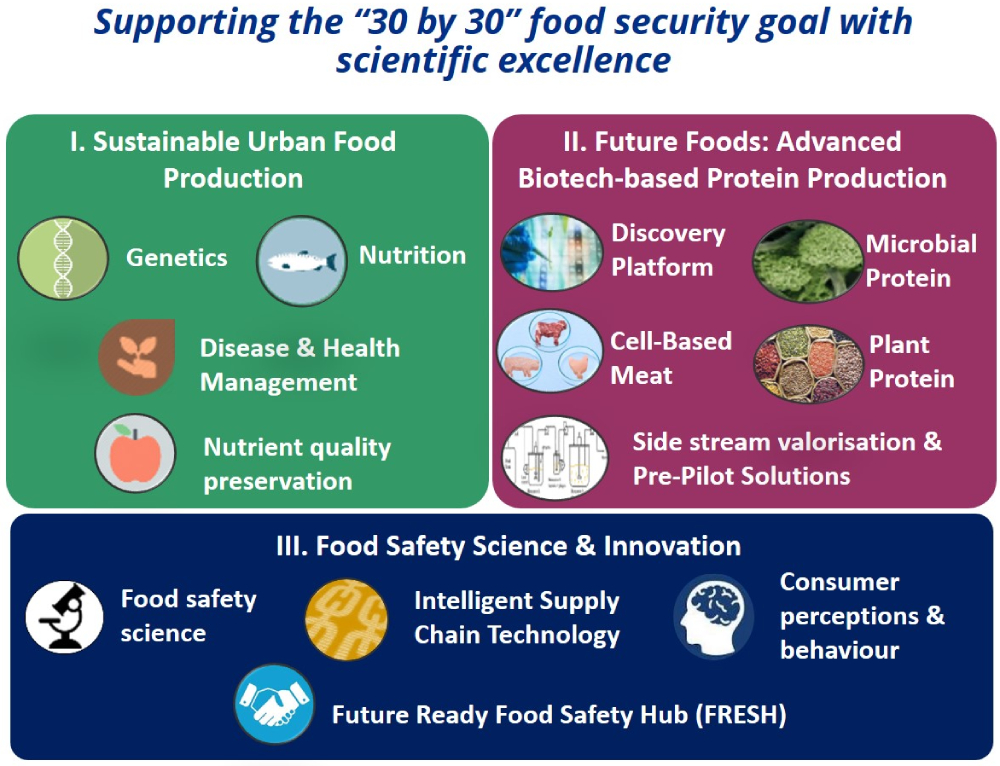Nationwide Programmes
Singapore Food Story
With the world population expected to hit close to 10 billion in 2050, the competition for land and water resources for food and ingredient production will only intensify. Meanwhile, unsustainable traditional agriculture practices are producing excessive amounts of greenhouse gases and other pollutants, which damage the environment, exacerbate climate change and further drain the earth’s finite natural resources.
Today, Singapore imports more than 90% of its food and is vulnerable to global trends that affect our food supply and safety. The Singapore Food Story was launched in a game changing move to enhance Singapore’s food security. The “30 by 30” vision is to grow enough food locally to meet 30 per cent of our nutritional needs by 2030, using less than 1 per cent of the available land area in Singapore. Simultaneously, the development of novel, innovative and sustainable solutions for the production of high-value foods and ingredients will capture economic opportunities for Singapore.
In 2019, the Singapore Research, Innovation and Enterprise Council (RIEC), chaired by Prime Minister Lee Hsien Loong, announced funding of up to S$144 million for an integrated Singapore Food Story R&D programme, which seeks to turn Singapore’s food challenges into opportunities by focusing on three themes.

Theme 1 – Strengthen Singapore’s food security by developing smart farming solutions for urban agriculture and tropical aquaculture to:
- Increase productivity of local food producers
- Save resources and operation costs with resource optimisation
- Improve disease and health management of agriculture and aquaculture
- Improve nutritional quality of produce
Theme 2 – Position Singapore as a comprehensive R&D hub for alternative proteins such as plant-based proteins, microbial proteins and cultured meat through:
- Development of novel biotech-based methods for high-value, sustainable and nutritious protein production
- Discovery, process development and scaling up of alternative proteins
- Creation of new technologies that enable circular bio-economy and improve sustainability of natural resources
Theme 3 – Boost Singapore’s food safety branding and quality using evidence-based science to:
- Ascertain emerging safety risks of novel foods
- Develop early warning and predictive modelling systems for emerging pathogens, food frauds and other food safety risks
- Understand consumer perception and social considerations of food innovations to improve their acceptability
Skin and Hair Health
Skin disorders affect one in three people globally but skin research is relatively underfunded worldwide. In Singapore, skin disorders are prevalent too, with one in five school-going children suffering from eczema. The multi-ethnic Asian population and tropical climate place Singapore in a unique position to conduct research that address distinct unmet needs in this field.
The Skin Research Institute of Singapore (SRIS), a collaboration between A*STAR, the National Healthcare Group, which comprises the National Skin Centre, and the Nanyang Technological University (NTU) was set up to conduct research on skin and hair conditions prevalent in Asia and the tropics. SRIS is the largest skin research institute in the world, with over 200 researchers. It harnesses the expertise of scientists, clinicians and engineers in a unique, multi-disciplinary approach to skin and hair research to improve the well-being and health of consumers and patients alike.
The key research programmes at SRIS include:
Our researchers are also working to gain a comprehensive understanding of the individual consumer’s health and exposure in real time, to create personalised solutions and evaluate how they perform. The new consumer diagnostics platform in development will bring together portable solutions in:
- Sensors (skin and environmental parameters)
- Non-invasive skin imaging
- AI tech to diagnose and monitor skin conditions in real time, as well as recommend personalised solutions and track performance
SRIS has also developed several technology platforms, such as:
Skin Health Monitoring Centre
A state-of-the-art infrastructure for clinical studies, utilising proprietary non-invasive skin and hair imaging technologies, such as photoacoustics and Raman spectroscopy. It also provides access to deeply-phenotyped Asian cohorts of various ethnicity, age and skin conditions.Asian Skin and Tissue Biobank
The biobank is a well-catalogued resource of skin tissues and isolated cells from different Asian ethnicities, age groups and body sites, processed under GMP-compliant conditions. The biobank aids the development of in vitro skin models and screening assays.Skin Immunomonitoring
The Skin Immunomonitoring Platform uses sophisticated genomic, proteomic and novel cell-based assays to provide a complete picture of the immune response in skin during the course of disease or therapy, just from a small biopsy. The platform also employs data management and mining solutions to optimise the integration and use of large volumes of patient-specific data.-
Advanced Microscopy
The A*STAR Microscopy Platform (AMP) brings together a broad range of award-winning light and electron microscopy capabilities, including on-site expertise to advise on the critical complementary techniques of sample preparation and quantitative image analysis.
In the News
Consumer
- Time does not heal all wounds: Bedsores killed 'Superman', don’t let them fester
- Singapore And South Korea To Tackle Skin Disorders And Cancer
- Capturing economic value, discovering treatments in skin research in Singapore
- A*STAR prototypes 3D printer for wounds
A*STAR celebrates International Women's Day

From groundbreaking discoveries to cutting-edge research, our researchers are empowering the next generation of female science, technology, engineering and mathematics (STEM) leaders.
Get inspired by our #WomeninSTEM
